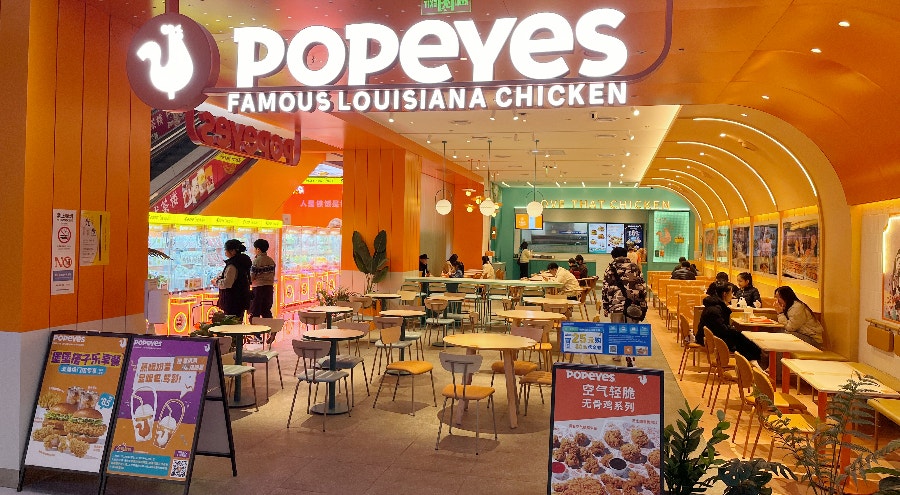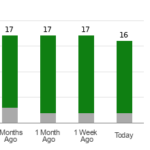
Key Highlights:
- TH International celebrates opening 10 Popeyes stores in China, totaling 919 stores in its network
- Company records strongest-ever growth for new store openings, despite falling short of the 1,000-store goal announced earlier
By Doug Young
Chinese fast food operatorTH International Ltd. (THCH) reported robust growth in new store openings during the fourth quarter of last year, unveiling plans to mark the opening of its 10th Popeyes store in the Mainland market. Despite this, the company’s flagship Tim Hortons chain witnessed a slowdown, adversely affecting its expansion goals disclosed earlier.
TH International, the master franchisee for Tim Hortons and Popeyes in China, announced a total of 919 stores, including 10 Popeyes outlets and the remaining from its main Tim Hortons chain. The company achieved a record 156 new store openings in the quarter, surpassing the total for the previous three quarters combined.
However, this figure notably fell short of the 1,000 stores that TH International aimed to have in operation by the end of last year, as per a company announcement midway through the year. The company has yet to address this shortfall and is expected to discuss any discrepancies when it releases its official fourth-quarter results later this year.
Investors showed muted response to the latest announcement, with a focus on Popeyes’ progress since its official launch last year. The stock remained largely unchanged on the day of the announcement, experiencing its second-lowest trading volume in the last month. Subsequently, it saw a modest decline of about 3%. The market may view the strong fourth-quarter store openings as encouraging, following three relatively weaker quarters for the expansion-minded company.
TH International is among several Western fast food operators aggressively pursuing growth in China, capitalizing on the burgeoning middle-class appetite. Notable players with similar expansion aspirations include Yum China (YUMC), recent opener of its 10,000th KFC outlet in the market, and DPC Dash (1045.HK), operator of the Domino’s Pizza chain in China targeting 1,500 stores by 2026.
TH International, a joint venture between venture capital firm Cartesian Capital, internet giant Tencent, local retailer Wumart, and Restaurant Brands International (QSR), charted its first Tim Hortons opening in China in 2018, followed by an aggressive expansion in subsequent years. The company previously set a target of 3,000 Tim Hortons in China by the end of 2026 in addition to the 1,000-store goal for last year.
The company’s shortfall underscores the influence of China’s slowing economy on ambitious expansion plans. After two decades of explosive growth, the nation’s second-largest economy has significantly decelerated in recent years, with consumer spending tightening across various sectors.
Evaluating Investor Sentiment
TH International is yet to win over investors as its China success story remains unproven. Since its listing via a special purpose acquisition company (SPAC) in 2022, the company’s shares have steadily declined, shedding approximately 80% of their value. TH International currently trades at a price-to-sales (P/S) ratio of 1.22, trailing Yum China’s 1.53 and lagging significantly behind DPC Dash’s 3.98. Restaurant Brands International trades at an even higher P/S of 5.22.
The company’s low valuation possibly reflects limited institutional investor participation and the absence of profitable operations, a growing concern for investors amid China’s economic deceleration. Despite a 42.7% year-on-year revenue increase in the third quarter, it marked a stark slowdown from the previous quarter’s 130% growth during the post-pandemic rebound. The deceleration stems partly from the company’s increased reliance on franchise partners for rapid new store openings, which generate lower revenue than self-operated stores.
The company’s progress towards profitability is evident, with adjusted store EBITDA doubling to 29.3 million yuan in the third quarter from 15.3 million yuan a year earlier. Its adjusted store EBITDA margin also improved to 7.5% from 5.3% during the same period, while the net loss narrowed to 160 million yuan from 195 million yuan a year earlier.
Although the company initially experienced a stock surge after announcing the Popeyes licensing deal, the rally was short-lived. With big investors staying cautious, waiting for the company to demonstrate sustained profitability amidst China’s economic slowdown and past failures with Popeyes, the stock remains muted.





